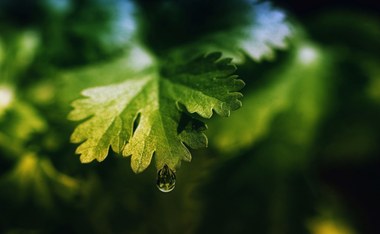Developing novel food packaging based on coriander for increased shelf life
(12-08-2019) GREEN-CHEM researchers are developing a sustainable food packaging based on coriander oil and recycled crustacean waste to prolong the shelf life of food.
Researchers of the GREEN-CHEM network at Ghent University are developing a sustainable food packaging based on coriander oil and recycled crustacean waste in order to prolong the shelf life of food products. To extract the coriander oil an innovative extraction process was invented in a collaboration between the Ghent University and Toulouse. An industrial partner already showed great interest in the now patented process.
The innovative packaging that is currently being developed consists of coriander oil and chitosan, a biopolymer derived from crustacean waste. The latter shows natural protective activity towards fungi and bacteria and is therefore an ideal possible antimicrobial component in packaging.
Professor Chris Stevens (Faculty of Bioscience Engineering, Ghent University) and his team attempt to chemically link chitosan and coriander oil, thereby creating a new product with interesting antimicrobial properties.
“Once the two molecules have been chemically linked together, the resulting product can be used as a packaging material for agricultural and food products. The main purpose would be to extend the shelf life of the food,” says professor Chris Stevens.
Innovative extraction process
The search for innovative applications for coriander oil is the subject of the doctoral research project of bio-engineer Evelien Uitterhaegen. Her PhD is a collaboration between the University of Ghent and the Institut National Polytechnique de Toulouse (INPT).
“At first, the research was aimed towards the elaboration of an efficient extraction process using a high-technological extruder press”, explains professor Stevens. This new patented process allows both the generation of high-quality oil, as well as further valorization of by-products from the remaining dry coriander cake. Currently, possible applications in construction are being investigated, for example as isolation material.
Professor Stevens: “In a bio-based economy, natural resources have to be used in the most efficient way possible, without generating a lot of waste. This aspect is essential with regard to the current sustainability goals.”
The coriander valorization project drew the attention of Ovalie Innovation (France), an R&D department of two industrial groups, i.e. Maïsadour and Vivadour. As an industrial partner of the project, Ovalie attempts to put the coriander oil into the market. In addition, the company wants to establish a new industrial production platform for the patented extraction process.
Launch GREEN-CHEM
The coriander project is an excellent example of the type of research Ghent University wants to focus on more in their new international network, GREEN-CHEM. The main goal of this network is to develop chemical products and processes using renewable resources in order to lower or even eliminate the use of hazardous substances.
GREEN-CHEM will be coordinated by Ghent University, but the international network combines the expertise of chemists from universities worldwide, including the INPT from Toulouse (France).
The official launch of GREEN-CHEM will take place on Thursday 14 September at the aula of Ghent University. International researchers and industrials will present their vision concerning green chemistry. It is also the perfect opportunity to gain first-hand information about the coriander project.
